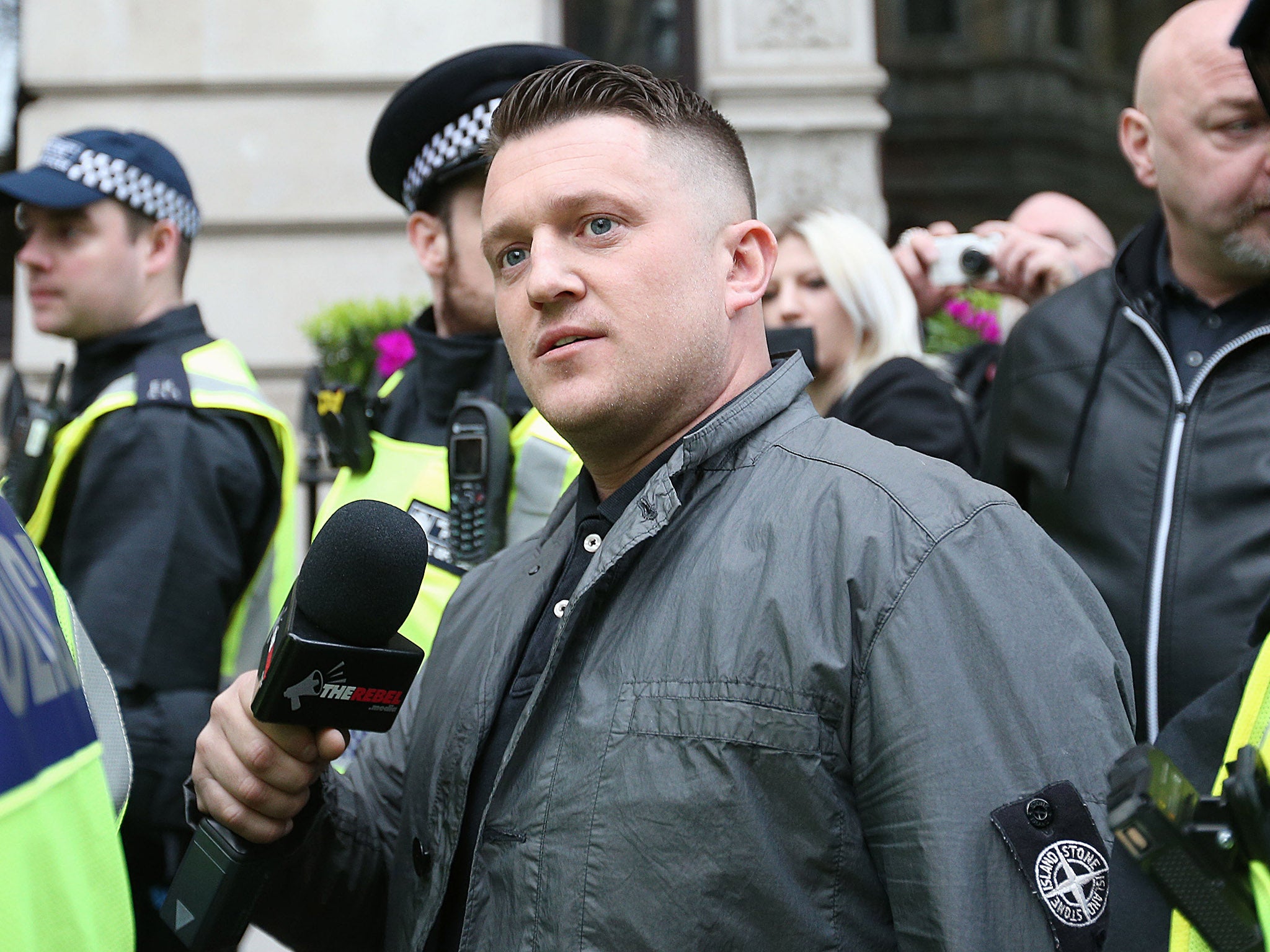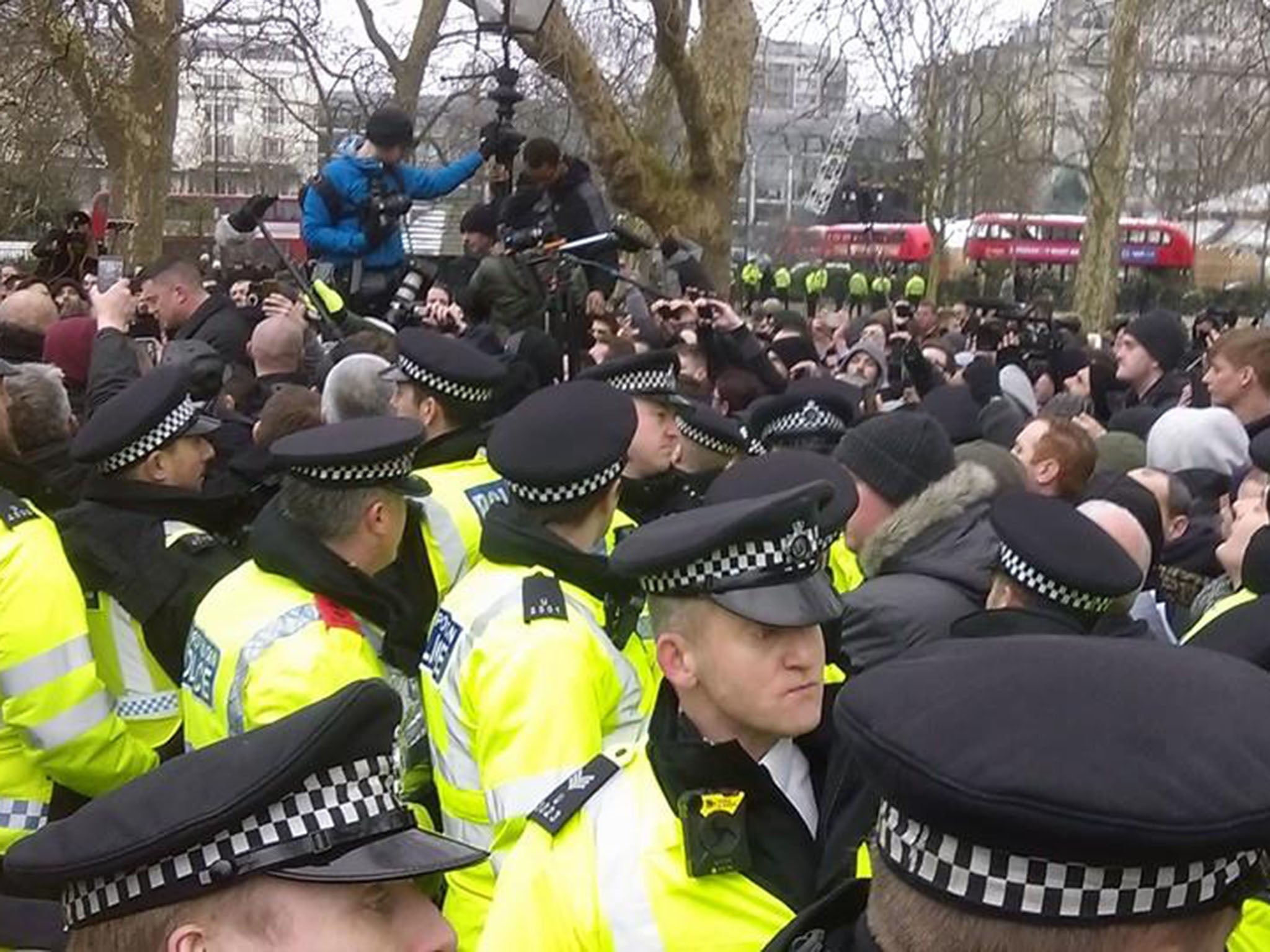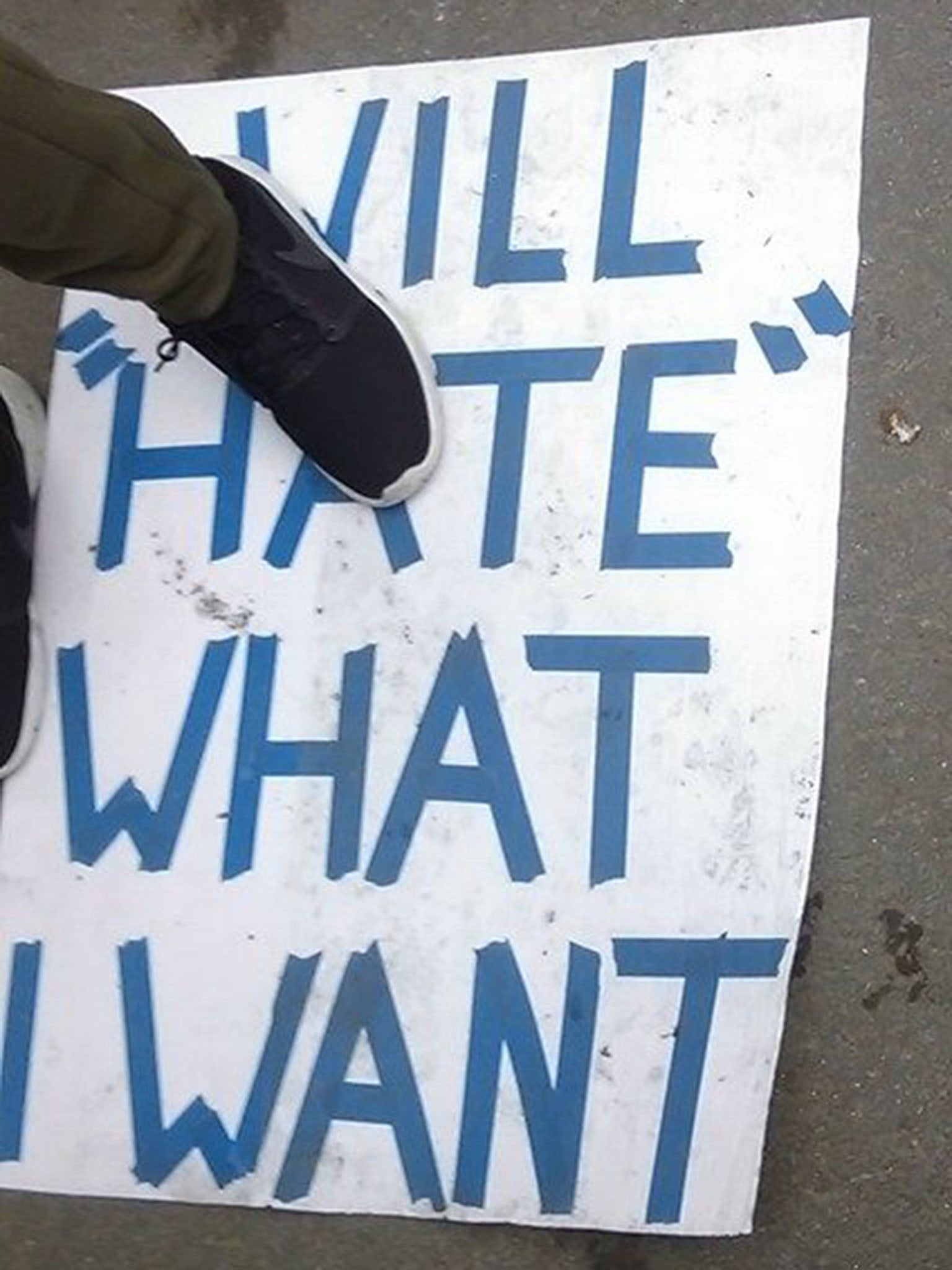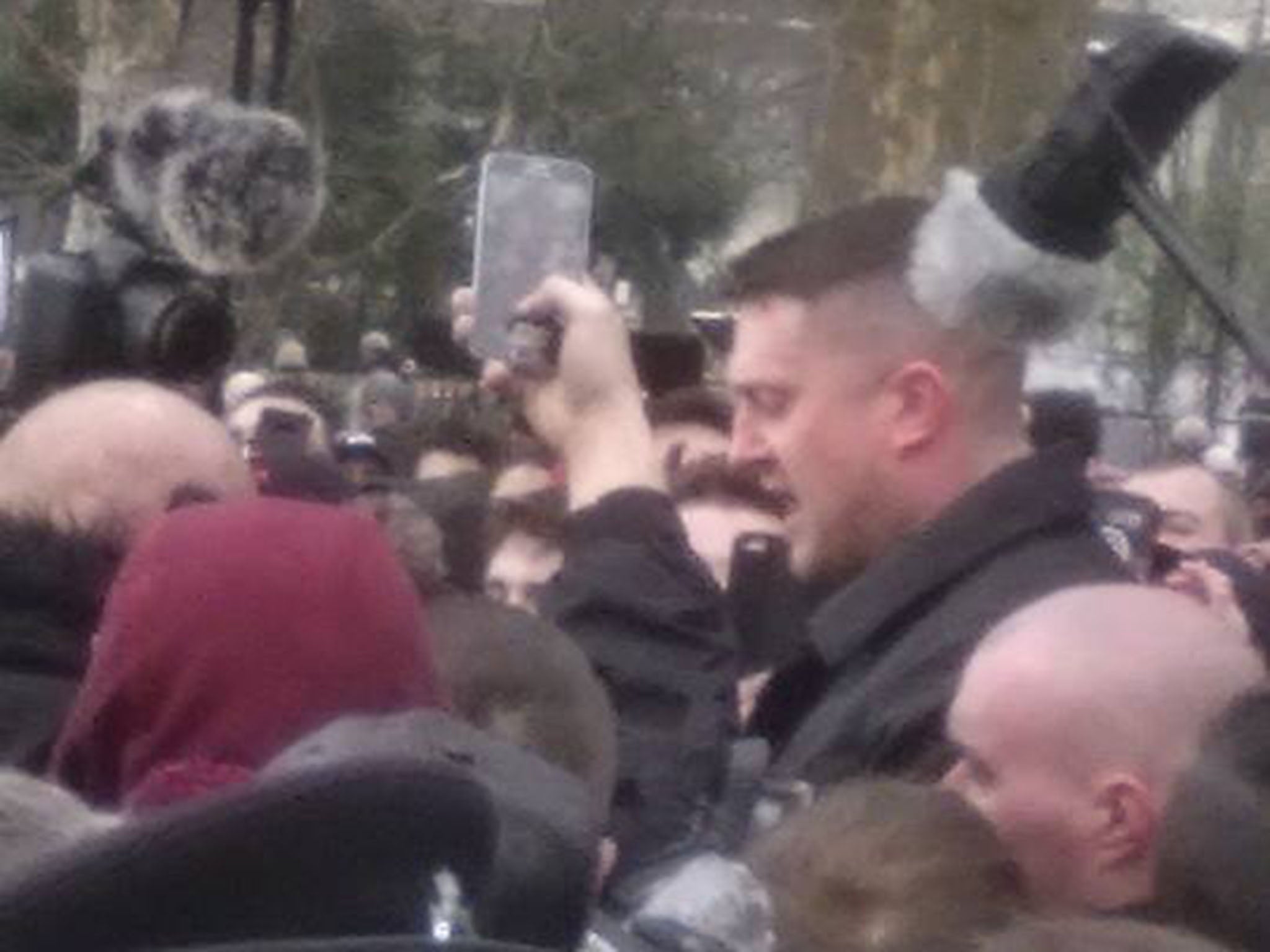I thought that by attending a Tommy Robinson speech I could understand his arguments – but there were none, only hate
A vacuum has been left by British society’s apparent inability to speak about certain issues, and it is this gap which Robinson has rushed to fill, all guns blazing

From the moment I was directed to Tommy Robinson’s livestream of an ongoing trial in Leeds, I wondered how long he would last. He had already received one suspended sentence for contempt of court for a previous livestream outside another ongoing trial, and it seemed he was in danger of falling foul of the law again.
Nevertheless, I proceeded to watch: I feel no shame in admitting that the sagas of Tommy Robinson are, if nothing else, compelling viewing. Moreover, I am a barrister by training and I wanted to see how this livestream would end. And end it did. Almost an hour and fifteen minutes in, Robinson was arrested by police for causing a breach of the peace.
The livestream was, for the most part, uneventful, although it did include one bizarre segment in which Robinson branched into a bit of improvisational comedy about the rainy weather, and how he should have brought his flip-flops. But by the end of the stream, no one was laughing, least of all Robinson.
In its aftermath, the man who perhaps likes to see himself as the enfant terrible of modern Britain was sentenced to a total of 13 months in prison (10 months for the latest contempt of court, plus the three which had been previously been suspended for the earlier offence).
It should be noted that he pleaded guilty. Nevertheless, almost as soon as the news of his imprisonment became public, the protests began.
The incident I’ve described would be fairly unremarkable if it were not for the man at its centre. People are quite often jailed for contempt of court; suspended sentence orders are fairly regularly breached, and people go to prison for such breaches.
For his supporters, Robinson’s jailing is proof that the establishment is out to stop him
Unusually, this case was initially subject to a reporting restriction, which would effectively have kept news of Robinson’s trial and imprisonment out of the media. Holding criminal trials in camera can be worrying sign for justice and free speech, although this decision was eventually overturned after an appeal by The Independent and Leeds Live.
The reason for the imposition initially of a reporting ban was based on a kind of logic (albeit flawed): a fear that coverage of Robinson’s case would draw attention to his contempt, and potentially increase the risk of prejudice to the trial he had been livestreaming which was also subject to a reporting restriction.

In that case, however, the existence of an order preventing information being published or discussed beyond the courtroom was hardly remarkable. Restrictions on media coverage of ongoing trials, especially involving multiple defendants and multiple sets of proceedings trials, is regular practice. The idea promoted by Robinson and his followers, that the reporting restriction (which will doubtless be lifted once all relevant trials are concluded) is an attempt to keep the public in the dark, is plainly wrong.
Still, the man born as Stephen Yaxley-Lennon has championed himself as a defender of freedom and a voice for the voiceless. As his website proclaims, he is “fighting for the forgotten people of the UK”. The website opens with the line, “The truth has to be told. I can’t do it without you”.
As the loud public protests across the UK have shown, Stephen/Tommy has morphed from a staunch critic of Islam to becoming the torchbearer for a large, mostly white, portion of the UK population which feels marginalised by what it regards as an out of touch, liberal elite. For his supporters, Robinson’s jailing is proof that the establishment is out to stop him.
The large rallies that have taken place following his imprisonment have often been violent: held under a sea of Union Jacks and accompanied by chants of Tommy Robinson’s name. A vacuum has been left by British society’s apparent inability to speak about certain issues, and it is this gap which Tommy Robinson has rushed to fill, all guns blazing: the recalcitrant lad from Luton, seamlessly moving from Newsnight’s BBC studios to jail cells; from the Oxford Union and back to pound the pavement of his home town, where he began as a football hooligan.
Like it or not, Robinson appears to have tapped into a certain sentiment that is prevalent among a proportion of our society.
***
It was to try to understand the reasons for this appeal that I attended a “free speech” event that Robinson “headlined” in Speakers Corner three months ago. This was before the livestream. Before the latest rounds of protest. Before his latest imprisonment. But looking back, it feels unsurprising that things should have turned out like they have.
So, let me tell you about a speech I did not get a chance to hear. The date was 18 March 2018 and the venue was Speakers’ Corner. I had last trodden here in 2004, as an earnest `8-year-old, and in a diary entry noted how “there was a surprisingly vibrant and dynamic… atmosphere”. Fast forward 14 years and it was neither vibrant nor dynamic. It was claustrophobic and ugly.

The reason for the throngs of journalists – although surprisingly little coverage in the news – along with several dozen police and hundreds of onlookers, was the presence of Tommy Robinson, there to read a speech by Martin Sellner, leader of Austria’s “Generation Identity” movement.
There had been little notice of the event in the mainstream press, but Tommy Robinson’s supporters, his opponents, freelance journalists like myself and the inquisitive had been made aware of it on social media. And we attended.
The sheer number of people there from all sides of the debate illustrated the power of Twitter, of Facebook, and of those who could be termed the “unlikely celebrities” of the WhatsApp age to pull a crowd. Tommy Robinson is one such celebrity. As are Mohammad Hijab and Ali Dawah (both YouTubers who were also in attendance, and whose views are rather different to those of Robinson).
Sadly, I did not get to hear what any of these three people said. But then again, little was said – little was debated. The irony is not lost that in Speakers’ Corner, there was very little speech on that bitterly cold Sunday.
From the start of the event, the atmosphere was obnoxious and febrile. I had managed to push as close to the front as I could, until I came up against the first line of the police cordon. Then there was a “sterile zone” and then another cordon. Union Jacks and the Stars and Stripes flutter to my right, chants of “Takbir, Allah hu Akbar!” are heard to my left.
I turn and see punches being thrown. We, the crowd, surge back; others surge forward. Tommy Robinson can be seen in the (near) distance, held almost in a bearhug by his own security. “He has his own security,” I blurt out. “He needs it,” says someone else.
More religious chants. More boos. More punches thrown – we surge forward, then back. By this time, Tommy Robinson has begun speaking, but cannot not be heard.
A vacuum has been left by British society’s apparent inability to speak about certain issues, and it is this gap which Tommy Robinson has rushed to fill
The police do not let the crowd advance further. Two men next to me square up – two others begin shouting in each other’s faces. One insults the other’s mum; there’s swearing, cursing, spitting. More shoving, pushing – we surge forward, then back: a pattern that’s familiar by now. The police bundle a man away.
By now, the crowd is getting increasingly restless. Some start chanting, “Free Speech!”; others, “Tommy Tommy Tommy Robinson Oohh Tommy Tommy!”; others boo. I am still standing, trying to report on a speech I can’t hear. Tommy Robinson concludes this barely audible speech by saying he will be back in Speakers’ Corner next Sunday.
“Police conspiracy! They don’t want us to hear him!” someone shouts. “The exact reason we’re here is to let him speak,” replies a policewoman.

Tommy Robinson disappears almost as soon as he appeared, as does Mohammad Hijab, one of the key figures in the opposing group. Their supporters and adversaries, foes and acolytes, linger like a frustrated sea of abandoned children while the rest of us – the writers, the spectators, the inquisitive, the excuse-makers, the bewildered – simply stare ahead, hemmed in by the crowds.
More insults fly, and some protestors put on balaclavas. The police close off some more exits as more harsh words are exchanged. The usual speakers of Speakers’ Corner – the pious, the proselytisers, the agitators – all seem to have been overshadowed by the enormity of the event. Some set up their stools and ladders, some take out their Bibles and Qur’ans, but the eyes of visitors such as myself as still distracted.
I see a discarded, forlorn placard nearby: “THE WORDS I CHOOSE ARE THE WORDS I’LL USE”. A middle-aged woman stands before me with a small poster with the symbol of a clenched fist: “Free Speech is a Civil Right”. There is another discarded sign on the ground, partially concealed by a man’s foot, which reads: “I WILL HATE WHAT I WANT”.
Hate. No banners proclaiming War is Over (it isn’t). No placards asking us to give peace a chance (fat chance). It seems we’ve been there, done that. Now there is just time for hate.
The snow starts to fall, and it is even more bitterly cold. I am tired of standing, tired of the cordons, tired of the futility of it all. A few discussions start to take place, but again, these soon come down to insults. In 2004, I noted in my diary how “spontaneous debates abound in Speakers’ Corner, something so fundamental to a working democracy”. But I do not feel like that this time.

Someone hands me a copy of the speech Tommy Robinson was meant to have (and presumably did) read out, though I couldn’t hear it.
Then again, this day was never just about one man, about one speech. I thought that by attending I could see how the land lies – the state we are in. As I begin to think about leaving, I can hear the usual topics and tropes: immigration, integration, grooming gangs, the war in Iraq, Christianity, Islam, Jesus, Muhammad, Brexit.
I don’t really get a chance to catch any of the arguments, but then again, not many arguments are being made. Just shouts. And chants. Here, in the divided, United Kingdom.
***
When I look back at the events of three months ago, I am struck by how symbolic the whole day was of the polarised state of play in contemporary Great Britain. Indeed, examining the reactions to the day of the various parties, each side thought that they had won.
Tommy Robinson, in his livestream from Leeds, proudly declared: “We have given birth again to the free speech centre of Speakers’ Corner.” Counter-protestors, too, spoke proudly of how they had disrupted the event, chanting above the speeches they did not want aired.

Each side, then, won in their own minds. But in reality, we all lost. We have now created a vacuum in which the polemicists, the extremists, the contrarians can all claim victory by shouting, or booing, the loudest. Defiance, rebellion and resistance are the prized characteristics which indicate success in this mired, confused field.
A century ago, it was the outlaw who some celebrated for his defiance. A few decades ago, it was the gangster rapper celebrated for his rebellious spirit. Now, it is the nationalists and the jihadists who lay claim to showcasing the best of resistance – but who in truth show the worst of humanity.
I am taken back to my final moments in Speakers’ Corner where two men (and it was predominantly men) started jabbing their fingers at each other, violently punctuating the air. People started running, and more fists flew – I knew it was time to leave.
And I remember the placard that read: “I will hate what I want.”
Hate abounds. There is no hope left. Only anger.
Bookmark popover
Removed from bookmarks